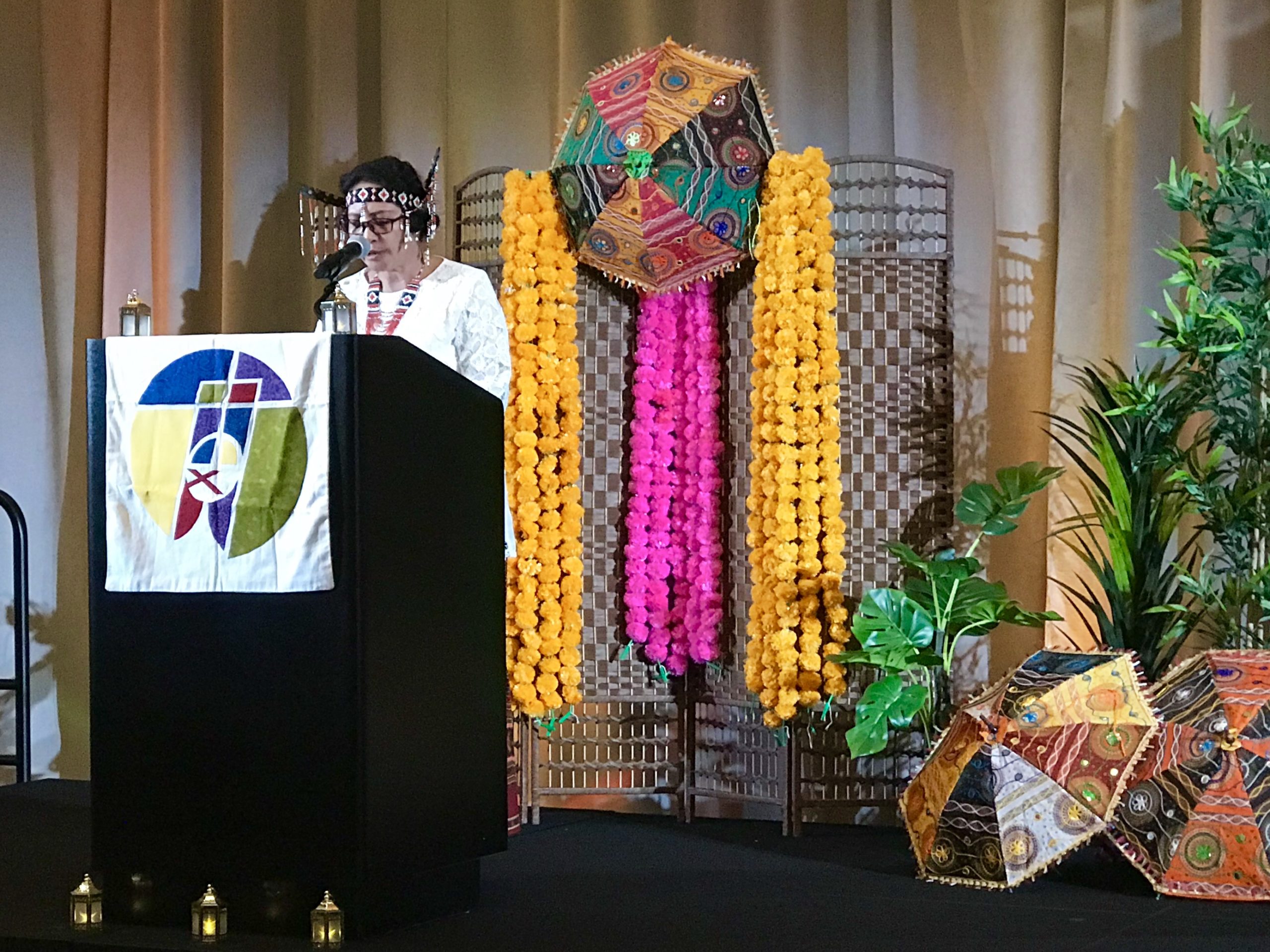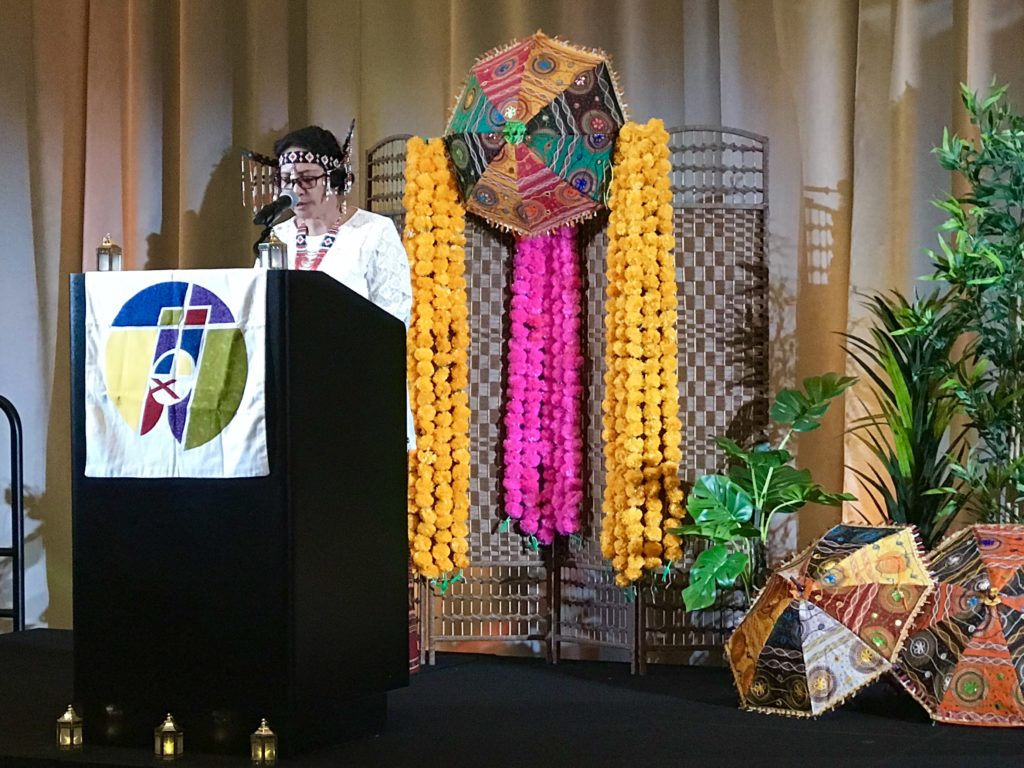Together in Hope (Romans 1:12) Reflection by Mery Kolimon
 Rev. Dr. Mery Kolimon, a well-known theologian, activist, and church leader from Indonesia, offered this keynote address at the International Dinner that marked the launch of Global Ministries Southern Asia Initiative 2019-20 at the General Assembly of the Christian Church (Disciples of Christ) in Des Moines, Iowa on July 22, 2019.
Rev. Dr. Mery Kolimon, a well-known theologian, activist, and church leader from Indonesia, offered this keynote address at the International Dinner that marked the launch of Global Ministries Southern Asia Initiative 2019-20 at the General Assembly of the Christian Church (Disciples of Christ) in Des Moines, Iowa on July 22, 2019.
Brothers and sisters in Christ, I am very grateful for this opportunity to attend and learn from this General Assembly of the Christian Church, Disciples of Christ.
I bring warm greetings from my church, Gereja Masehi Injili di Timor, the Evangelical Christian Church of West Timor, commonly known by its acronym GMIT in Indonesia.
GMIT’s relationship with Global Ministries began in the 1970s when the United Church Board for World Ministries (UCBWM) sent Rev. Walter Snowa and his family to serve together with us in GMIT. At that time, he was assigned especially to lay leadership training. Then in 1983 until now, Rev. John and Ms. Karen Campbell-Nelson have served together with us in GMIT.
From 2009 to 2017, I was a member of the Global Ministries Board representing Southern Asia and during those years I learned a lot. Through conversations with board members, I learned about the challenges you face in your church and society here and how you respond to them. I also learned how you continually transform your understanding and positions in relation to your ecumenical partners around the world. While I was a member of the Board, I also had several opportunities to share about my context.
Nevertheless, this is the first time I have attended a General Assembly of the Disciples of Christ and I feel very blessed for this opportunity to learn from this experience. I am especially happy because you are launching the Global Ministries Southern Asia Initiative during this assembly. I think this initiative will open many opportunities for your churches here, along with your partner churches in Southern Asia, including my church, to engage in mutual learning and mutual support for our ministries.
Opening the Text
I have been asked to speak on the theme of this Southern Asia Initiative, “Together In Hope.” The Biblical text that serves as the foundation for this theme is Romans chapter 1, verse 12: “ . . . that we may be mutually encouraged by each other’s faith, both yours and mine” (New Revised Standard Version).
This text is part of Paul’s letter in which he expresses his longing to visit the faithful in Rome. Paul had already heard good news about their faith. A number of commentators say that Paul wrote this letter while he was in Corinth gathering help for the community of faith in Jerusalem.
By visiting them, Paul wanted to share a spiritual gift (carisma pneumatikon) to strengthen the community of faith in Rome (verse 11). As an apostle who had been blessed by much spiritual grace to minister in non-Jewish settings, Paul realized that he could share his experience and understanding of his faith with them.
At the same time, he wanted to discover the fruits of a faithful life among the Christians in Rome. Paul was convinced that God’s community of faith in Rome, whose members had varied backgrounds, who were both Jews and Gentiles, had already born fruits of their faith. Personally, the Apostle also wanted to learn and be strengthened by the community of faith there. Certainly, he was blessed with many advantages, but at the same time, he also experienced many challenges in his ministry. He needed to be strengthened by the people in Rome.
That is why he said they could strengthen and complement each other based on each faith. In the visit that he hoped was imminent, he and the community of faith in Rome could encourage, give hope, and support one another.
Together in Hope Toward the Reign of God
Paul’s words in this text can inspire us in our contemporary ecumenical relationships, especially as we begin our work together in the Southern Asia Initiative, which begins this year and continues through 2020.
Churches around the globe have a strong basis for continuing to place our hope in God’s continuing work of salvation among us. Developments in world history often give us cause for grave concern as we face the global phenomena of political tribalism, religious radicalism, poverty, injustice, environmental destruction, climate change, forced migration, and human trafficking. It can be so overwhelming. But the churches must not lose their vision of God’s work of salvation for this world, and God’s call to the churches to be involved in this work of salvation. God’s authority extends to all of creation. God rules over world history. In this faith, we put our hope together.
Mission as Engagement
As Paul hoped that his meeting with the faithful in Rome would provide mutual strengthening and capacity building, we hope that the Southern Asia Initiative will be an opportunity for the churches in North America and Southern Asia to enrich one another so that we together will be more committed and competent as agents of the Reign of God. We need to find ways of learning together so that we may be strengthened in the struggle for justice, peace, and the integrity of creation.
I have learned in my limited experience as a theologian and a church leader that many of our churches are only busy with themselves: with routine programs that serve the institution, organizational issues, pastors’ salaries, building projects, church order, etc. Often the church neglects any serious involvement with public issues. Often the church fails to understand the rapid change taking place all around it, and therefore fails also to make an adequate theological or pastoral response.
If in the past (especially during the colonial period) mission was understood to be one-way, from the stronger churches to the weaker ones, the Southern Asia Initiative that we are launching together must become a commitment to support a multi-directional mission, one that enables us to learn from one another in a spirit of honesty and humility. We hope this Initiative will create a space in which together we can strengthen the church’s advocacy on public issues relating to injustice, conflict, human rights violations, environmental destruction, discrimination, and violence. In this way, we work shoulder to shoulder and to do the Good News that we preach and give voice to the prophetic message of our faith.
Spiritual Kenosis
I also feel it is important for us to reflect on issues of power in our Initiative. For a long time, America was seen as an economic, political, and cultural superpower, and the churches of America seemed to have superpowers as well. Of course, the churches of Southern Asia want to learn from the churches of North America, but we also hope that there will be a reciprocal interest on the part of North American churches to learn from the churches of Southern Asia.
I have learned from my experience with the GM Board that your two churches are very aware that as a result of secularization, the church is no longer at the center of society. The church is now on the margins. I have also learned how you embrace marginalized peoples, the unjust realities they face, and have made this a part of your theological and ecclesiological agenda. I have seen how this is a continuous process, to do theology on issues like racism, religious plurality, and gender diversity.
The churches of Southern Asia still have a lot of homework to do in order to define their identities and their mission in light of the past history of colonialism. Christianity came along with the colonizers, who had motives for economic profit and political power.
In Christ, God’s self-emptying took the form of a servant and entered into the totality of human life. It is our hope that through this initiative our churches will be able to empty themselves of the privileges of the past and enter into the full diversity of life and ministry in our various contexts, in order to preach and to be God’s good news in Jesus Christ.
In Timor, we have a tradition: if we meet someone, especially our friends, our family members, we will each take out our betel nut containers and offer one another betel nut, and then sit down and enjoy it together. This initiative is a meeting in which we are invited to take out the riches of experience and faith that each of us has, and to share them, enjoy them together, and strengthen one another’s ministries. At the same time, we all need to be open to the empowerment of the Holy Spirit who calls and sends us to ministry each in our own place.
By saying this I want to offer Global Ministries our betel nut container, as a symbol of open our heart, embracing the initiative, as space of sharing and mutual learning. May God be with us in this initiative.
Hear from Rev. Dr. Mery Kolimon, human rights activist and feminist theologian of the Evangelical Church of West Timor (GMIT) in Indonesia. Mery serves at the Moderator of the GMIT and Professor of Missiology, Contextual Theology, and Theology of Religions at Artha Wacana Christian University in Indonesia. Global Ministries Awards of Affirmation will also be given.

